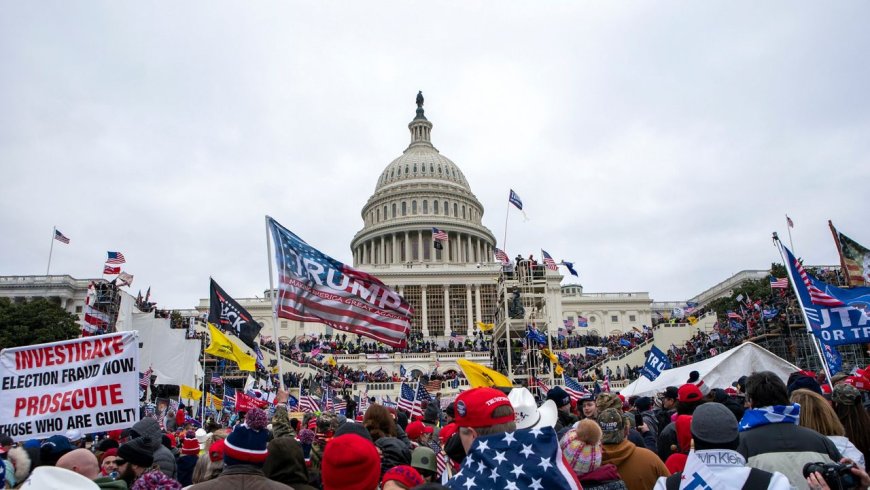Republican Leaders’ Evolving Stance on January 6: From Condemnation to Support
In the wake of the January 6, 2021, insurrection at the U.S. Capitol, Republican leaders were quick to condemn the violence, calling it a grave assault on democracy. At the time, many expressed shock and anger at the mob that stormed the Capitol in an attempt to disrupt the certification of the 2020 presidential election results. However, just a few years later, many of these same leaders, some now in key positions in the Republican Party and the Trump administration, have shifted their rhetoric, offering a much more sympathetic view of the rioters.

Republican leaders promptly condemned the violence, describing it as a severe assault on democracy, in the aftermath of the January 6, 2021, insurrection at the U.S. Capitol. The mob that invaded the Capitol in an effort to disrupt the certification of the 2020 presidential election results was met with widespread astonishment and wrath at the time. Nevertheless, a mere few years have passed since then, and a number of these same leaders, some of whom are currently in prominent roles within the Republican Party and the Trump administration, have altered their rhetoric, presenting a much more empathetic perspective on the demonstrators.
In a recent speech, former President Donald Trump expressed his intention to pardon a significant number of those involved in the violence on January 6. He referred to them as "hostages" who were being persecuted by a "witch hunt." Many members of the Republican Party responded to his remarks with acclaim, which represented a significant shift from the previous stance that party leaders had taken in the wake of the attack.
This change is in stark contrast to the robust condemnations that Republicans issued promptly following the Capitol's breach. The assault was categorically condemned by prominent figures, including Senate Minority Leader Mitch McConnell, Senator Lindsey Graham, and former House Speaker Kevin McCarthy. McCarthy, for example, characterized the assault as "domestic terrorism" and contended that President Trump was accountable for inciting the violence. McConnell, in the same vein, characterized the occurrences as "a violent insurrection" that was designed to reverse the election results.
Key Republican figures from Trump's orbit were vocal in their criticism of the violence as the January 6 demonstrators were arrested and prosecuted. The day was deemed "tragic" by Elise Stefanik, who is currently a potential nominee for the U.N. Ambassador. Stefanik urged for the most thorough prosecution of those responsible at the time. The Capitol attack was described by Senator Marco Rubio as "anti-American anarchy of the third world," while Governor Kristi Noem of South Dakota, who is currently the frontrunner for the position of Homeland Security Secretary, described it as an attack on the nation's fundamental values.
The assault was met with dismay by even members of Trump's inner circle who had endorsed his rhetoric in the months preceding January 6. Vivek Ramaswamy, who is currently the co-leader of the Department of Government Efficiency, characterized the day as "dark for democracy" and harshly criticized Trump's post-election conduct.
However, as Trump's political influence has persisted, numerous Republican leaders have moderated their previous statements. Trump reiterated his intention to pardon those convicted of participating in the Capitol insurrection during a 2024 campaign event. This stance is consistent with his previous statements and is garnering support among Republicans. At a rally in Washington, D.C., he proclaimed, "I will be signing pardons for the J6 hostages to free them." He then went on to say that he would "sign pardons for a lot of people" upon reentering office.
Critics have expressed increasing apprehension regarding this transition, contending that it undermines the fundamental principles of democracy and law. The same legislators who once unambiguously advocated for the prosecution of the Capitol demonstrators now seem to minimize the gravity of their actions. For instance, Speaker of the House Steve Scalise, who had previously referred to the rioters as "domestic terrorists" in January 2021, currently occupies a leadership role in a House in which a significant number of Republicans defend the rioters' actions as either justified or exaggerated by Democrats.
The initial condemnations of even those who were once considered staunch critics of Trump have now been retracted by important figures in the GOP. Senator Tim Scott of South Carolina, who had previously described the Capitol violence as "unacceptable," has since joined Trump in diminishing the importance of the disturbance. In the same vein, Ron DeSantis, the governor of Florida and a potential candidate for the 2024 Republican presidential nomination, has retracted his previous condemnation of the violence in favor of concentrating on other matters, including the military and the economy.
The Republican Party's rhetorical shift is indicative of a broader trend to reframe the events of January 6, 2021, as a broader partisan conflict rather than a direct attack on democratic institutions. The ongoing polarization of the American political landscape has resulted in severe divisions regarding the appropriate way to commemorate and address the events of that day.
It is uncertain whether this rhetorical shift will significantly alter the Republican Party's future as the political climate continues to change and Trump's influence continues to dominate the party. It is undeniable that January 6, which was once perceived as a tragic event by Republicans, has evolved into a representation of a much more profound ideological divide that has the potential to significantly alter American politics.
Ultimately, the transformation appears to be fundamentally driven by the reconciliation of political loyalty, law, and order. As the nation approaches the next presidential election, the issue of whether this will bolster or erode the GOP's position in the future will persist.













































